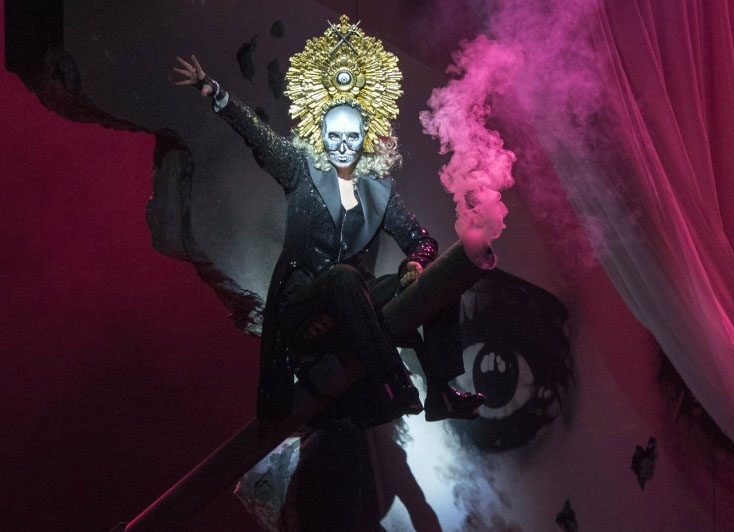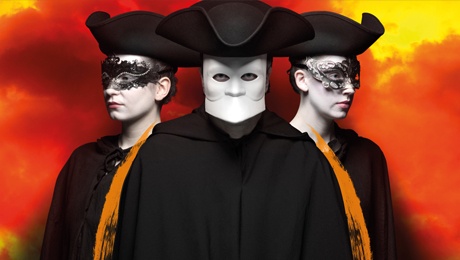DON GIOVANNI
The Welsh National Opera have produced an exquisite version of this old tale of lechery and its comeuppance. Don Giovanni is a man blessed with privilege but uses his power to feed his appetite for sexual ‘conquest’ at a cost to everyone else around him. An unfettered sexual predator, Giovanni’s moral compass atrophies as his arrogance flourishes, leading him, inexorably, to his fate in the flames of Hades.
Tonight’s production was blessed with performances of the highest calibre from the entire cast and orchestra – a gem to savour and keep in the memory. Set in the Spanish Golden Age and acted against imposing high dark walls and a centre piece inspired by Rodin’s ‘Gates of Hell’, it would be difficult to imagine a more spirited and sumptuous production than this.
Gavin Ring possessed the physical presence and swagger needed to convince as our anti-hero. Swathed in a luxurious gold detailed white cloak, and bedecked in fine gold waistcoat, white breeches and boots and topped with a flamboyant hat and feather, Ring’s Don Giovanni bullied and beguiled his victims with a smile on his face and a spring in his step. While his delivery could be fulsome and sweetly melodic, his presence always filled the stage, a focal point around which all else revolved. Whether boisterously ordering wine and women to a party in ‘Fin ch’han dal vino’ or softly serenading Donna Elvira’s chambermaid in ‘Deh, vieni alla finestra’, Ring’s range was always commanding and expressive.
While Leporello (David Stout) steers a witty path around his abusive master and presents as an engaging but compromised clown doing his best to warn off new suitors, it is the visceral rage of Donna Anna (Emily Birsan) and Donna Elvira (Elizabeth Watts) which holds the moral core of the story, both women abused and abandoned by Don Giovanni. Later Katie Bray as the (nearly) seduced peasant bride-to-be Zerlina picked up this theme, but also sings the more conciliatory ‘Vedrai carino’ aria with teasing sympathy to her injured husband-to-be Masetto, played with gruff vigour by Gareth Brynmor John.
After Giovanni kills her father, the Commendatore, Anna duets with her avenging fiancé Don Ottavio (Benjamin Hulett): ‘Ah, swear to avenge that blood if you can!’. She leaves us in no doubt that she means business. Mozart has imbued her lines with the sorest tenderness and the steeliest of resolves which Birsan embraces with mesmeric force.
Watts also injects a tempest of regret into Donna Elvira’s mood, ‘That ungrateful soul betrayed me, O God, how unhappy he has made me!’ Hulett later impeccably delivers his two heartfelt arias, ‘Dalla sua pace’ and ‘Il mio tesoro’ with delicious tenor tones.
John Napier’s dark and foreboding set has been choreographed just as much as the characters. What begins as a long high dark wall, punctuated with porticoed doorways and embellished with writhing human forms, breaks apart to create extravagant spaces or slides back to form intimate chambers. Large headless angels loom at the wall’s perimeter, while at its centre, the gates of Hell always loom large, sometimes before a glowing full moon. And the statue of the murdered Commendatore (Miklós Sebestyén) becomes an eerie centrepiece as it morphs into Don Giovanni’s nemesis, aided by the subdued but atmospheric lighting of David Hersey. Napier and Yoon Bae’s costumes pay homage to Spanish 17th century style – with elaborate use of layered velvet and lace.
A brisk tempo was held throughout by the WNO orchestra, led by conductor James Southall, who at one point, baton in mouth while playing the harpsichord, impressively maintained the beat by nodding his head. There was a thrilling lightness of touch in the string work, and a delightful clarity of tone from an enhanced woodwind section.
As Don Giovanni is consumed, once again, by the flames, we’re left with a sense of shared triumph in WNO’s vision for this most popular of Mozart/da Ponte collaborations. ★★★★★ Simon Bishop 13th April 2018

LA FORZA DEL DESTINO
Sometimes referred to as the ‘Prince of Pessimism’, Giuseppe Verdi, with librettist Francesco Maria Piave, has wrung from La Forza every possible drop of anguish in a study of fatalism that condemns its three main protagonists to the most tragic of conclusions. Our only respite is that he revised the original ending to reduce the number of fatalities.
What seems to come from nowhere, however, is an extraordinary, almost surreal section in the second act which tears up everything you’d expect of a classical opera, turning it into a burlesque dance macabre, led by a glimmering and grinning figure of death rejoicing in mayhem. The WNO has seized on this, using Forza to question a myriad of issues about violence being an end in itself, whether by accident or design. Once we march to its tune, we learn, only devastation can lie ahead.
Leonora wishes to elope with her lover Don Alvaro, who has been rejected by her father the Marquis of Calatrava. Torn by her love of her home and her father, she hesitates as Alvaro pleads with her to flee with him. Her father suddenly bursts in on the lovers. Alvaro, in his attempt to do the right thing by Leonora, throws down his gun. As it hits the ground, the gun goes off accidentally killing the Marquis. The lovers flee the scene leaving Leonora’s brother Don Carlos to pledge revenge for the killing, swearing to track down kill both his sister and Alvaro.
Thus we are propelled into a series of scenarios in which Leonora and Alvaro, now split up in the confusion of flight disguise themselves in order to dissolve into the background. Don Carlos takes false identity too as he relentlessly hunts the pair down, first to a military camp where recruits are being goaded to war, later to a monastery where Leonora pleas for sanctuary as a hermit, and where, unbeknownst to her, Alvaro seeks also to find sanctuary as a monk after his experiences on the battlefield. Mistaken identity briefly unites hunter and hunted before dissolving disguises give way to deadly denouement.
Holding the night together as the appallingly compromised Leonora, American soprano Mary Elizabeth Williams summoned extraordinary power to deliver the dizzying architecture of Verdi’s score, always melodically controlled and acting with believable poignancy, especially during her heartfelt aria Pace, pace mio Dio!
Central too to the opera’s story is the relationship of Alvaro and Don Carlos, a ‘failed brotherhood’. With four duets between them, Verdi explores, first, their misplaced amity with the harmonic, sympathetic lines in Amici in vita e morte, before rending the relationship apart with one pleading, the other mocking in rasping overlapping lines in ‘Invano Alvaro ti celasti al mondo (In vain did Alvaro hide you from the world). Gwyn Hughes Jones as Don Alvaro and Luis Cansino as Don Carlos delivered double barrel-chested resonance to the demands of these testosterone-fuelled roles. Miklós Sebestyén’s sublime bass tones found ample opportunity for expression in the role of Padre Guardiano.
Latvian soprano Justina Gringytė almost stole the night as the ‘gypsy’ girl Preziosilla. Costumed like some sparkling Nazi nightclub hostess, Gringytė oozed seductive evil intent as she glorified war, goaded male children to leave their mothers and march, fabulously delivering her lines in Al suon del tamburo (at the sound of the drum). In the night’s most livid moment she memorably sat astride the barrel of a blazing canon as it cut down the bodies before it.
Forza’s relentlessly dour story was sometimes not helped by a too-cumbersome rotating stage that had to be heaved by stagehands wearing ear pieces which had the effect of undermining the willing suspension of disbelief.
However, director David Pountney gave us some extraordinary staging: a disturbing marionette theatre depicting helpless conscripts on strings attended by skull-headed soldiers; and an equally troubling order of flagellants preparing the way for Leonora’s sanctuary – these thrilling visuals seemed to paint Church and State as equal partners in an orgy of pain and death.
Endlessly dark, often disturbing and sometimes shockingly inventive, this WNO production meets Verdi’s ambition full on. The WNO orchestra under the steady baton of Carlo Rizzi gave an exemplary performance, with some delightful accompaniment on harp and woodwind adding to a rich weave of full orchestration. ★★★★☆ Simon Bishop 15th April 2018


